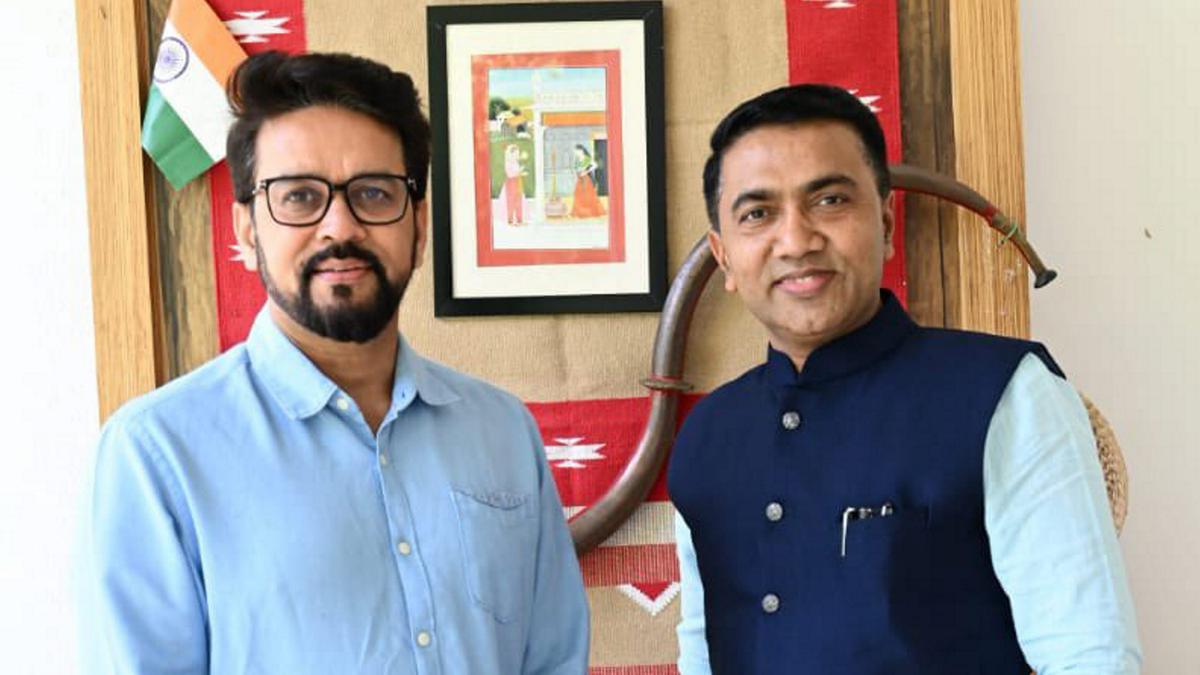
In Madhya Pradesh outreach, Union Minister Anurag Thakur, Goa CM Pramod Sawant slam INDIA bloc over Sanatana Dharma row
The Hindu
BJP challenges Congress leaders to break silence on DMK leader's remarks on Sanatana Dharma. Union Minister Anurag Thakur and Goa CM Pramod Sawant allege INDIA bloc wants to "eradicate Sanatana Dharma"
The Bharatiya Janata Party (BJP) in Madhya Pradesh continues to up the ante over Dravida Munnetra Kazhagam (DMK) leader and Tamil Nadu Minister Udhayanidhi Stalin’s remarks on Sanatana Dharma. On Monday, Union Minister Anurag Thakur challenged senior Congress leaders Sonia Gandhi and Rahul Gandhi to break their silence on the issue, while Goa Chief Minister Pramod Sawant alleged that the INDIA alliance wanted to “eradicate Sanatana Dharma”.
Mr. Thakur and Mr. Sawant were in the State to join two separate ‘Jan Aashirwad Yatras’ — a pan-State outreach exercise — in the Mahakoshal and Malwa Malwa Nimar regions, respectively.
Since Prime Minister Narendra Modi reportedly told his Ministerial colleagues that Mr. Udhayanidhi Stalin’s remarks would have to be met with a “proper response” based on the “facts of the issue” within the contemporary situation, and emphasised that the Constitution did not allow for abuse of any religion, party leaders have maintained an aggressive stance over the controversy.
Continuing the same stance in Seoni on Monday, the Union Minister even said that Mr. Udhayanidhi Stalin’s comments were like “blowing up Babasaheb Ambedkar’s Constitution”. “By drawing comparisons with dengue, malaria and AIDS, the law and the Constitution are being blown up and Mr. Rahul Gandhi is giving lectures sitting in a foreign land. He should answer why Babasaheb Ambedkar’s Constitution is being blown up by Congress and the INDIA alliance leaders,” Mr. Thakur said.
Meanwhile, in Khargone, Mr. Sawant said the INDIA alliance wanted to destroy Sanatana Dharma, something which even the Mughals, British and the Portuguese could not do in India or Goa.
While the State leadership of the Congress has distanced itself from Mr. Udhayanidhi Stalin’s remarks, the ruling party’s own unit here, too, realises that, although limited, the issue will have some electoral impact.
“We are counting on our various schemes and Mr. Modi’s work as the mainstay of the campaign but this issue has come out of nowhere and we will continue to corner the INDIA alliance to whichever extent possible,” a source said.

“Writing, in general, is a very solitary process,” says Yauvanika Chopra, Associate Director at The New India Foundation (NIF), which, earlier this year, announced the 12th edition of its NIF Book Fellowships for research and scholarship about Indian history after Independence. While authors, in general, are built for it, it can still get very lonely, says Chopra, pointing out that the fellowship’s community support is as valuable as the monetary benefits it offers. “There is a solid community of NIF fellows, trustees, language experts, jury members, all of whom are incredibly competent,” she says. “They really help make authors feel supported from manuscript to publication, so you never feel like you’re struggling through isolation.”

Several principals of government and private schools in Delhi on Tuesday said the Directorate of Education (DoE) circular from a day earlier, directing schools to conduct classes in ‘hybrid’ mode, had caused confusion regarding day-to-day operations as they did not know how many students would return to school from Wednesday and how would teachers instruct in two modes — online and in person — at once. The DoE circular on Monday had also stated that the option to “exercise online mode of education, wherever available, shall vest with the students and their guardians”. Several schoolteachers also expressed confusion regarding the DoE order. A government schoolteacher said he was unsure of how to cope with the resumption of physical classes, given that the order directing government offices to ensure that 50% of the employees work from home is still in place. On Monday, the Commission for Air Quality Management in the National Capital Region and Adjoining Areas (CAQM) had, on the orders of the Supreme Court, directed schools in Delhi-NCR to shift classes to the hybrid mode, following which the DoE had issued the circular. The court had urged the Centre’s pollution watchdog to consider restarting physical classes due to many students missing out on the mid-day meals and lacking the necessary means to attend classes online. The CAQM had, on November 20, asked schools in Delhi-NCR to shift to the online mode of teaching.









